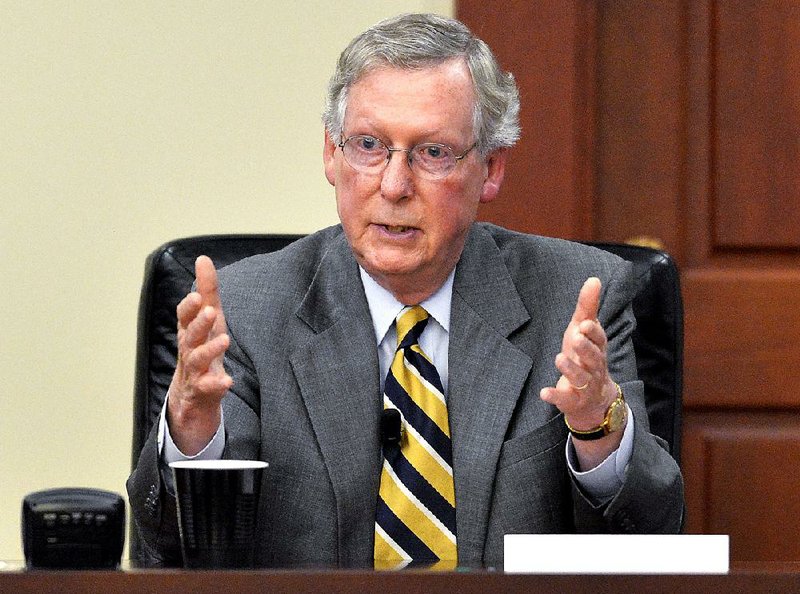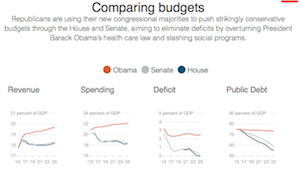WASHINGTON -- The U.S. Senate adopted a fiscal 2016 budget that calls for $5.1 trillion in spending cuts to achieve balance in 10 years while avoiding proposals to partially privatize Medicare as many Republicans brace for re-election.
The budget bill passed in a 52-46 vote Friday. Republican Sens. John Boozman and Tom Cotton of Arkansas voted in favor of the measure.
The White House criticized the budget plan, saying it would hurt middle-class and low-income families.
Republicans, with a 54-46 Senate majority, could afford only three defections to adopt the budget. Sen. Ted Cruz of Texas, who is seeking the 2016 Republican presidential nomination, and Sen. Rand Paul of Kentucky, a potential 2016 contender, cast the only Republican votes against the budget.
The final vote came after the Senate voted in a marathon session on dozens of politically charged amendments that could become campaign fodder.
After then passing a bill that would exempt grid-enabled water heaters from pending Energy Department efficiency standards and promote energy efficiency in commercial buildings, the Senate adjourned at 4:22 a.m. Friday and will not reconvene until April 13. The Senate did not take up House-passed legislation to ward off an April 1 cut in Medicare physician payments.
Republicans have long criticized Democrats about the U.S. budget deficit, so failing to adopt a budget would have been a major blow to their new Republican majority.
"For years, the Democrat-led Senate refused to pass a balanced budget," Majority Leader Mitch McConnell said on the Senate floor. "It usually failed to produce any budget at all. Maybe this made the special interests happy, but it was infuriating for many in the middle class."
The budget resolution won votes because it backed more defense spending than President Barack Obama has proposed. To appease advocates of more defense spending, the plan places money in a special war-funding account that isn't subject to spending limits.
"It's the best option we currently have for leaving the next president in a better position to face global challenges," said McConnell of Kentucky.
White House Press Secretary Josh Earnest on Friday said spending cuts in the budget resolution are "draconian." The Senate plan would ask more of the middle class than wealthy Americans and cuts Obama's priorities, he said in a statement.
"The president has been clear that he will not accept a budget that locks in sequestration or one that increases funding for our national security without providing matching increases in funding for our economic security," Earnest said. "The administration will continue to abide by these principles moving forward."
Obama in February sent Congress a $4 trillion budget proposal that would exceed defense-related spending caps by $38 billion and domestic caps by $37 billion.
Senate Republicans avoided a plan to partially privatize Medicare that the U.S. House of Representatives embraced in its budget. The Senate plan instead calls for $430 billion in spending cuts without explaining where they would be made.
The Medicare provisions will now be the subject of a House-Senate conference committee next month.
Paul and Sen. Marco Rubio of Florida sought even more defense funding. Paul, who has made a name for himself by pressuring leaders to accept spending cuts, proposed an amendment that would have added almost $190 billion to defense spending over the next two years and covered the cost by making cuts in other areas, including foreign aid and the Department of Education. It failed.
Rubio joined with Cotton to propose a separate amendment to increase defense spending. That proposal didn't specify any reductions. It also failed.
The budget plan includes $96 billion in war funding in 2016, about $38 billion more than Obama has sought.
Democrats described the budget full of "gimmicks," noting it would repeal the Affordable Care Act and eliminate health care for millions of people, while keeping the revenue generated by Obama's law. Sen. Bernie Sanders, a Vermont independent who caucuses with Democrats and sits on the Budget Committee, said the budget would harm the middle class and poor.
"We'll make it harder for kids to go to college, we'll throw people off health insurance, but we will not ask the rich and powerful to pay more in taxes," Sanders said on the floor.
If the House and Senate can agree on a joint budget, that would allow use of a special procedure to let Republicans send legislation repealing the health-care law to the president's desk.
Obama has said he would veto such a measure. But Republicans said a Supreme Court case challenging most of the law's federal subsidies could get Obama to the negotiating table to change the law.
Information for this article was contributed by Billy House and Angela Greiling Keane of Bloomberg News.
A Section on 03/28/2015


